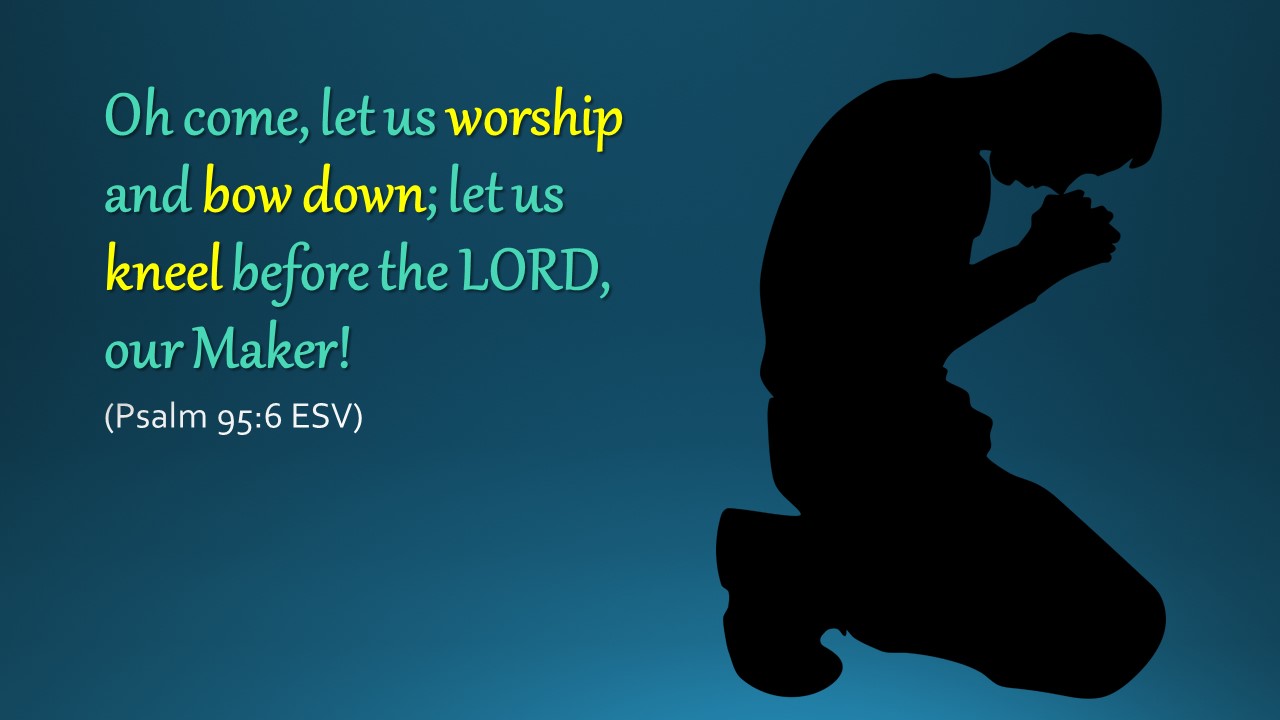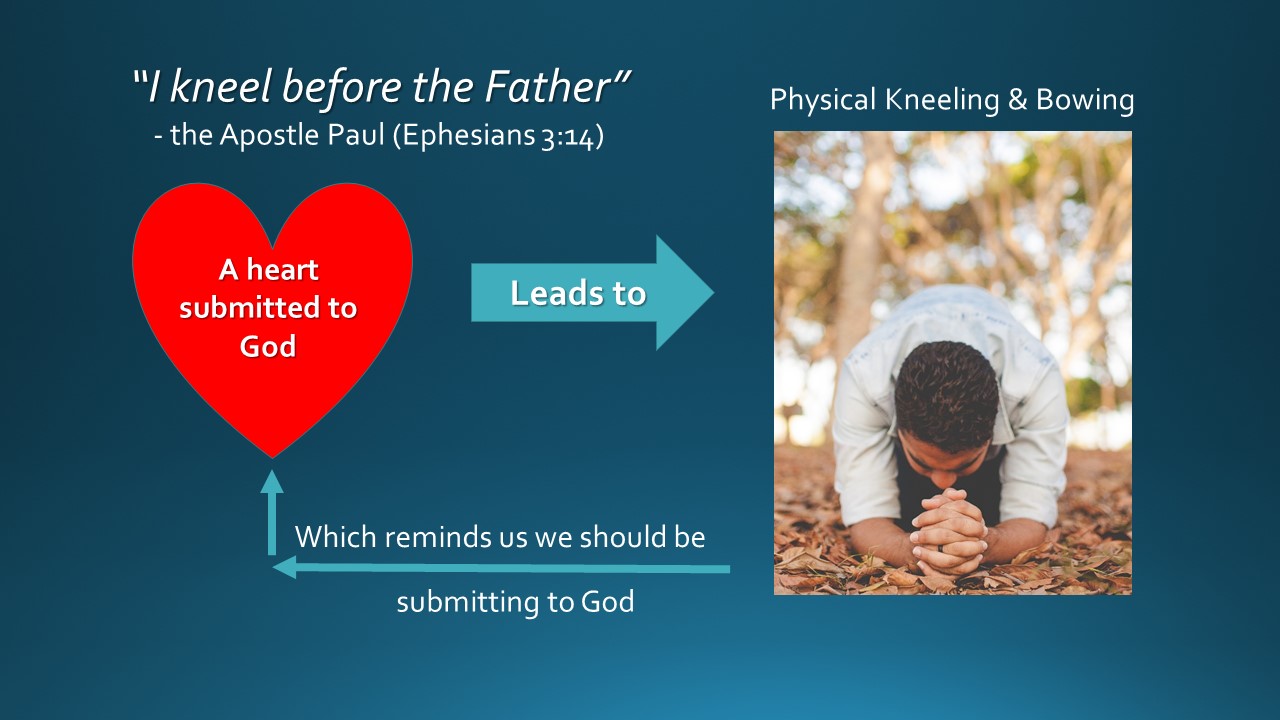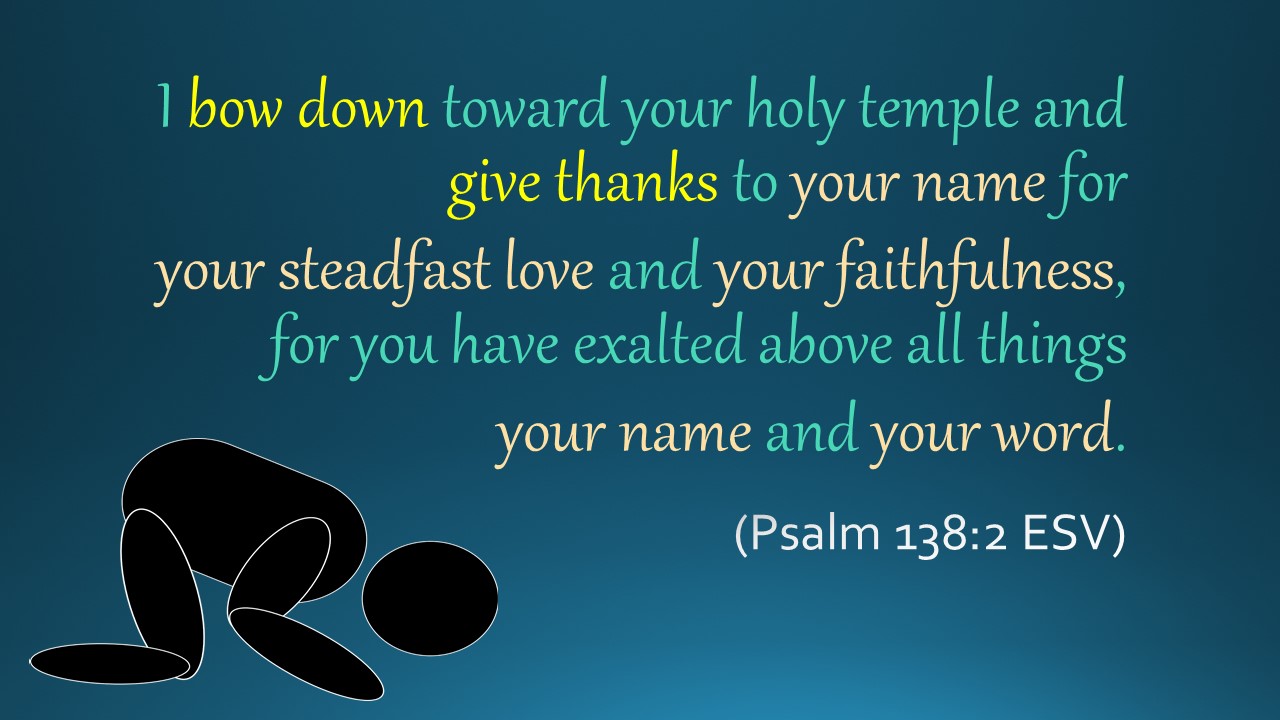- Jun 1, 2017
- 911
- 758
- 60
- Country
- United States
- Gender
- Male
- Faith
- Christian
- Marital Status
- Married

Throughout the Bible, from Genesis to Revelation, we see people bowing to God in worship. Today, in many church services you will never see anyone kneel, much less bow down to the ground in worship.
I suspect that even in our private prayer lives, Christians physically bow or kneel to God less often than God’s followers did in both the Old and New Testaments.
Does this matter? Is there any benefit to kneeling and bowing to God as part of our prayer lives and worship?
The first place we should look to try to answer this question is the Bible. Let’s start by looking at some verses about bowing to God in worship and kneeling to God in prayer:
NIV Genesis 24:26 Then the man bowed down and worshiped the LORD,
NIV Exodus 34:8 Moses bowed to the ground at once and worshiped.
ESV Joshua 5:14b And Joshua fell on his face to the earth and worshiped and said to him, "What does my lord say to his servant?"
NIV 2 Kings 17:36 But the LORD, who brought you up out of Egypt with mighty power and outstretched arm, is the one you must worship. To him you shall bow down and to him offer sacrifices.
ESV 2 Chronicles 7:3 When all the people of Israel saw the fire come down and the glory of the LORD on the temple, they bowed down with their faces to the ground on the pavement and worshiped and gave thanks to the LORD, saying, "For he is good, for his steadfast love endures forever."
NIV 2 Chronicles 20:18 Jehoshaphat bowed down with his face to the ground, and all the people of Judah and Jerusalem fell down in worship before the LORD.
NIV Nehemiah 8:6 Ezra praised the LORD, the great God; and all the people lifted their hands and responded, "Amen! Amen!" Then they bowed down and worshiped the LORD with their faces to the ground.
NIV Psalm 66:4 All the earth bows down to you; they sing praise to you, they sing the praises of your name."
NIV Isaiah 45:23 By myself I have sworn, my mouth has uttered in all integrity a word that will not be revoked: Before me every knee will bow; by me every tongue will swear.
NIV Isaiah 66:23 From one New Moon to another and from one Sabbath to another, all mankind will come and bow down before me," says the LORD.
NIV Daniel 6:10 Now when Daniel learned that the decree had been published, he went home to his upstairs room where the windows opened toward Jerusalem. Three times a day he got down on his knees and prayed, giving thanks to his God, just as he had done before.
NIV Acts 20:36 When Paul had finished speaking, he knelt down with all of them and prayed.
NIV 1 Corinthians 14:25b So they will fall down and worship God, exclaiming, "God is really among you!"
NIV Philippians 2:9 Therefore God exalted him to the highest place and gave him the name that is above every name, 10 that at the name of Jesus every knee should bow, in heaven and on earth and under the earth,
NIV Revelation 11:16 And the twenty-four elders, who were seated on their thrones before God, fell on their faces and worshiped God,
The verses listed above are only a small sample of the many verses in the Bible about bowing, kneeling, and falling to the ground before God in worship and prayer. Kings and prophets bowed down and worshiped. Apostles kneeled and bowed. And according to the Bible, one day, every creature in existence will be bowing before God.
Modern Christian churches may be one of the few places in the history and future of the world where God’s people rarely physically bow to worship. That seems strange to me.
And there’s more Biblical evidence to consider.
The Most Common Greek Word Translated “Worship” Means “To Bow Down to Someone”
Several Greek words in the New Testament (and in the ancient Greek translation of the Old Testament, called the Septuagint (LXX)) are sometimes translated “worship”. The second most common Greek word group for worship is Latreuo (a verb) and Latreia (a noun), which basically mean “to serve God”:
NIV Romans 12:1 Therefore, I urge you, brothers and sisters, in view of God's mercy, to offer your bodies as a living sacrifice, holy and pleasing to God-- this is your true and proper worship (latreia).
Thus, latreia, means “worship” in a very broad sense.
But the most common Greek word in the New Testament for “worship” is not latreia, but proskuneo. The literal meaning of prokuneo is to fall face down in front of someone (usually out of respect, fear, or adoration). In New Testament verses which use the word “worship” to translate proskuneo it is not always obvious to English readers that the “worship” included bowing down, but this would have been very obvious to the original Greek speaking readers of the New Testament.
Considering what the Bible says about bowing down and kneeling (and we’ve only looked at a tiny fraction of the relevant verses), it seems like we are missing something if we don’t regularly bow down in worship and kneel in prayer. As I’ve thought about this and discussed it with others, I’ve encountered some legitimate concerns.
Three Concerns Related to Bowing and Kneeling
1. It is the heart that matters, not the outward appearance.
It is unquestionably true that God pays attention to what is in our hearts rather than merely our outward appearance:
NIV 1 Samuel 16:7 But the LORD said to Samuel, "Do not consider his appearance or his height, for I have rejected him. The LORD does not look at the things people look at. People look at the outward appearance, but the LORD looks at the heart."
Based on this principle, some people are rightly concerned that bowing down, especially in a setting where others are present, could be used merely to appear “more religious” than others, or to look good in front of others.
This is a legitimate concern. But it does not mean that we should not physically bow in worship or kneel in prayer in public worship. Imagine if we applied this line of thinking to other acts of worship. Some people sing out loud without really meaning the words. Some might even sing just to impress others. Does that mean no one should sing? Some people attend church to be seen by others and to look good. Does that mean that no one should attend church? Just because some people misuse a visible act of worship, does not mean that others should avoid that act. It does mean that whenever we bow or kneel (or sing or give or attend) we should seek God’s help to ensure we are doing so with the right motives.
Also, we should realize that what is in our heart should be expressed in our actions, and that in turn our actions do influence our hearts. The more we choose in our hearts to submit to God, the more willing and glad we should be to bow down and kneel before Him, and the more we bow down and kneel before Him, the more our hearts will readily submit to Him in all of life’s choices. (For those of you who are a bit “geeky”, engineers and scientists call this a positive feedback loop.)

2. Some Godly Saints are Physically not Able to Bow or Kneel
Some of the most godly people I know simply are not able to bow or kneel, at least not without great difficulty. This most often applies to older people. As we age our joints “stiffen”. However, there are also some young people who have injuries or bad backs or knees which prevent them from bowing and kneeling.
If we start to have more times where people are encouraged to bow and kneel when praying and worshiping the Lord with other Christians, we need to be careful to stress that those who cannot do so are in no way inferior.
In my study of all the uses of proskuneo in the New Testament, I found only one example where it obviously did not involve physically bowing down to the ground:
ESV Hebrews 11:21 By faith Jacob, when dying, blessed each of the sons of Joseph, bowing in worship (proskuneo) over the head of his staff.
It is unlikely that this verse is referring to Jacob bowing to the ground with his staff lying flat on the ground. Rather, it seems to be referring to Jacob bowing his head while leaning on his staff. This makes sense because Jacob was very elderly at this time and probably could not bow down to the ground. In a similar way, those who cannot bow down to the ground today can simply bow their heads as they are able to do so, knowing that God is seeing the attitude of their hearts.
Warning: There is a difference between not bowing due to age or injury and not bowing because we don’t want to be a bit uncomfortable. Even for the young person, it would be more comfortable to remain sitting. But we should be willing to be uncomfortable for our Lord. After all, He left the comfort of His throne in Heaven to humbly serve us. And His Apostles left the comfort of their homes to spread His gospel. So being a bit less comfortable by kneeling or bowing in worship should not bother us. If it does, perhaps it is a sign that something is amiss in our hearts.
3. The Arrangement of Seats or Pews in Most Churches Makes Bowing and Kneeling Impractical
This is true. I don’t know of a simple solution, but I will offer some thoughts.
If we want to include more bowing and kneeling in our worship and prayer, we don’t have to start with mass bowing in the Sunday morning service. Start by encouraging people to feel free to bow or kneel during prayer meetings and other settings and places where the setting makes it easier to do so. Also, occasionally make times during your service where if someone does want to bow or kneel in the aisle or in front of the seats, or back behind them (depending on your seating arrangement) they know that it is acceptable to do so. Finally, remind people that they can bow and kneel at home alone or with their family or friends in worship and prayer. As bowing and kneeling become more normal (as it was for the prophets and Apostles, and many Christians throughout history) God can help us find the right ways, times, and places to put it into practice.
What Does Bowing and Kneeling Mean?
Bowing and kneeling will be more meaningful if we understand their purpose. After spending a fair bit of time reading and studying many Bible passages which mention falling to the ground, bowing, and kneeling, along with passages about submission and being at or under the feet of our Lord, I have come to the following conclusions:
1. Bowing and kneeling are good, Biblical ways to show that we recognize that God is greater than us and that we choose to submit to His authority. It shows we want His will, not ours.
2. Bowing and kneeling can demonstrate that we are desperate for God’s help, and recognize that we are completely dependent on His grace and mercy.
3. Bowing and kneeling are (or should be) outward expressions of humility. Kneeling helps us to be and feel humble. God helps the humble (1 Peter 5:5).
4. God is worthy to have us bow in submission to Him. We can bow with thankful hearts because the One we bow to is not a cruel tyrant, but our loving Heavenly Father. He uses His great power according to His love, grace, and mercy. We can bow with joyful hearts, not only out of submission, but also out of adoration.

This was originally a post on my blog.

